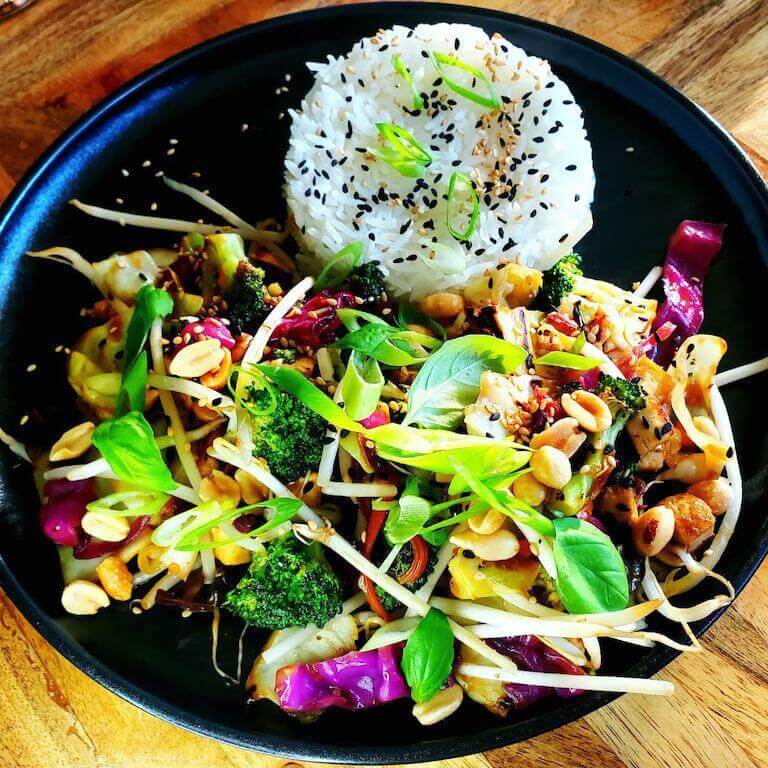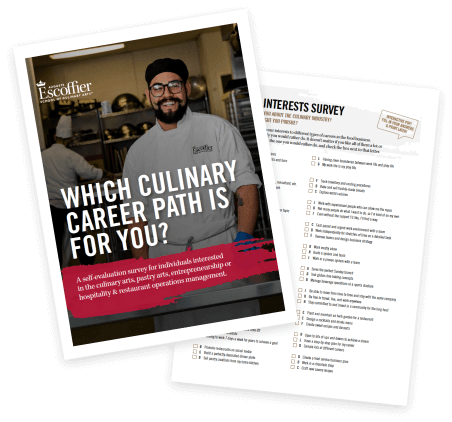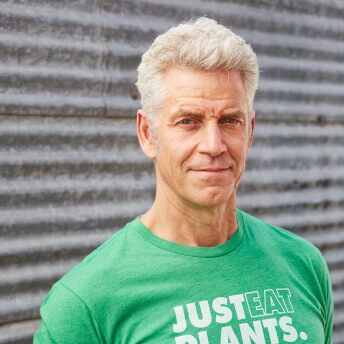Listen to This Article:
Sauteed quinoa fried rice. Savory kimchi dumplings. Buddha bowls bursting with kale, chickpeas, and tahini. Vital, raw, colorful salads full of beets, carrots, butterhead lettuce, cilantro, and sunflower seeds. If you’re passionate about vegan foods, you’re not alone.
Though only approximately 4% of US consumers are fully vegan, according to Statista, 14% of U.S. consumers follow a meat-free diet, and Novus Insights stated that 43% of US consumers consider themselves flexitarians, meaning they eat mostly vegetarian. The Good Food Institute reported in 2023 that the market for plant-based foods was worth $8.1 billion.
With these kinds of numbers, there is a growing need for chefs who are trained to plan and prepare vegan meals, and to design vegan products.
But how should you go about becoming a vegan chef? What skills do you need, and what kind of training should you get? Let’s dive into what you need to do to become a vegan chef.
Vegan Chef Basics
With all the confusing diet terms out there, you might feel unsure about exactly what “vegan” means. A person eating a vegan diet chooses to avoid any and all animal products or by-products, including meat, dairy products, eggs, or even ingredients like honey. In a nutshell, a vegan chef prepares dishes that are free of animal products.

Plant-based entree cooked by Escoffier Plant-Based Program Graduate Dianna V.
What Are the Core Ingredients of a Vegan Diet?
A vegan diet includes all manner of plant foods, everything from whole grains, fruits, and vegetables to nuts, seeds, as well as regular foods that don’t contain animal products, like bread, pasta, and tortillas.
But because vegans don’t use animal products, they also often rely on a palette of substitutes for animal-sourced foods. This includes meat substitutes like tofu, tempeh, seitan, or manufactured meats like Beyond Beef; dairy substitutes like almond, rice, or oat milk, coconut or cashew-based vegan cheeses; and vegan sweeteners like maple syrup or agave syrup.
If you want to become a vegan chef, it’s important to become well-versed in how to use these products, because they require different cooking methods than their animal-product counterparts.
Plant-Based vs. Vegan: What’s the Difference?
The terms “plant-based” and “vegan” can often be used interchangeably, but they’re not exactly the same.
- Plant-based is a blanket term that could refer to vegans, vegetarians, or even those who want to limit their consumption of animal products without avoiding them completely.
- Vegan means a diet or lifestyle that completely eliminates animal products like meat, seafood, and dairy. Some vegans may eat animal byproducts, like honey, while others totally eliminate them – including in clothing, cosmetics, or household goods.
Making Sure Vegan Dishes Have Adequate Nutrition and Good Flavor
A diet free of animal protein has the potential to be protein deficient. Though no one dish can provide all of a diner’s nutrition needs, vegan chefs can do their part to help vegan diners meet their nutrition requirements, all while making the food taste good. This means developing dishes that have adequate protein, and understanding the common vegan nutrition gaps, but also getting creative with cooking techniques and unique ingredients.
Building Your Skills as a Vegan Chef
There’s no one playbook for how to become a vegan chef, but there are some key skills that you’ll need to develop to be a competitive hire in the culinary industry.
Begin with a Solid Culinary Education
No matter what kind of chef you wish to be, gaining the foundational skills that train you to work in or manage professional kitchens is essential. The fastest way to attain these skills is by attending a dedicated culinary school. Everything from knife skills to kitchen budgeting is needed for success. Kitchen managers and professional chefs tend to prefer to hire people who already have a culinary degree or diploma because they need less training.
Get a Plant-Based Education
If you have your heart set on becoming a vegan chef, the fastest way to get there may be to pursue a culinary degree from a school that offers a dedicated plant-based program, like the one at Auguste Escoffier School of Culinary Arts.
Inside a plant-based program, you can learn foundational recipes and techniques for preparing plant proteins like tofu and tempeh, baking without dairy and eggs, and using non-animal products like soy, mushrooms, and nutritional yeast to create depths of flavor and umami. You can also explore the flavor influences of different cuisines to help inform your menu choices, farm-to-table ethics to learn more about incorporating seasonal flavors and supporting environmental sustainability, and how to create interesting and tasty vegan menus.

Getting a formal culinary education in plant-based cooking is one way to become a vegan chef. Escoffier offers an online plant-based culinary diploma program.
An education from a reputable institution like Escoffier can provide you with extensive knowledge of plant-based substitutes and recipe modifications, menu planning and design. Plus, you can study foodservice operation management and get mentoring from experienced Chef Instructors and like-minded peers, which can set you up for professional success.
You can also reach some of these training goals with self study or by mentoring with a well-known vegan chef.
Explore How to Stay Creative as a Vegan Chef
Just knowing how to cook isn’t enough to be an exceptional chef. This is especially true in the vegan and vegetarian world, where these foods have a reputation for being bland, boring, and flavorless. One thing that sets professional vegan chefs apart from amateurs is the ability to create your own culinary voice and to innovate to elevate the ordinary to the extraordinary.
Culinary school can help you learn the foundations that will allow you to be a creative flavor leader as a vegan chef.
Getting Started as a Vegan Chef
Once you have an education under your belt, it’s time to get (plant-based) cooking. As in most culinary traditions, you’ll likely have to work your way up to the level of head chef.
You can start with a full- or part-time job in a plant-based kitchen or as part of an internship or externship.
This might take the form of working within a dedicated plant-based kitchen. It could mean cooking specific vegan menu items – appetizers, entrees, or desserts – in a restaurant that otherwise serves dishes that include animal products. It may even look like being a private chef for a vegan client.
There are also plant-based food trucks and plant-based delivery services, as well as research and development professionals who find the best recipes for plant-based meat substitutes. So many options exist in the world of plant-based culinary arts that vegan cooks and chefs should never feel limited.
The only way to get really good at something is to practice, practice, practice… and having the option to observe others working these skills can help too. You might learn about sautéing veggies and proteins in culinary school, but observe your boss steaming her tempeh before further preparing it for a final dish.
By picking up useful tips, getting guidance on your technique, and working with a team to create plant-based masterpieces, you can be better prepared to work your way up to a vegan sous chef or executive chef position.
Alternatively, if you’re interested in being your own boss, you can create an entrepreneurial vegan food venture, by creating your own vegan food products, restaurant, or food truck. You could establish a bakery, create sauces or salad dressings, or develop a whole restaurant concept. There’s no one right way to become a vegan chef, except the one that excites and inspires you!

Take the Culinary Career Survey
We’ve compiled a checklist of all of the essential questions into one handy tool: career options, culinary interest surveys, educational opportunities, and more.
Earn Additional Culinary Credentials to Enhance Your Vegan Chef Aspirations
Though there aren’t many specifically plant-based credentials just yet, there are general culinary credentials that can enhance your resume and help you look like a good hire. For example, the American Culinary Federation offers certifications for Certified Chef de Cuisine ®, Certified Executive Chef ®, and Certified Master Chef ®. The World Association of Chefs’ Societies or The Retail Bakers of America also offer general certifications.
If you’re interested in building your credibility among the plant-based culinary community, you might consider earning an additional credential from one of these professional organizations.
Listen to The Ultimate Dish Podcast Episodes Featuring Plant-Based Chefs & Culinarians
Find a Plant-Based Program That Meets Your Needs
Seeking an education on becoming a vegan chef? A great place to start looking would be a plant-based culinary school.
There are a variety of plant-based and vegan cooking classes out there, but if you’re wanting a well-rounded education, you might consider getting that diploma or degree. Escoffier’s programs in the plant-based culinary arts can help prepare you to launch a meaningful career in plant-based cooking.
Students can discover the craft of plant-based culinary arts, examine farm-to-table principles, and complete a hands-on externship in a professional kitchen or foodservice establishment that may help them network with industry professionals. Reach out to us today to talk through your options for financing your education.
EXPLORE OTHER ARTICLES ABOUT PLANT-BASED AND SUSTAINABLE LIFESTYLES:
- What to Know When Opening a Vegetarian or Vegan Restaurant
- What Can You Do with a Plant-Based Degree or Diploma?
- 3 Tips For Becoming an Environmentally-Conscious Chef
*Information may not reflect every student’s experience. Results and outcomes may be based on several factors, such as geographical region or previous experience.
This article was originally published on May 4, 2022 and has been updated.




